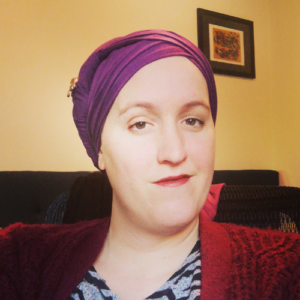
By Jay Smith
Keshet spoke with Rabbi Xava De Cordova (she/her) and Binya Kóatz (she/her), co-founders of Shel Maala, a digital-first queer Yeshiva founded in 2020 for Trans Day of Visibility.
Keshet: Tell me about how Shel Maala came into being.
Xava: I was very sick, independently of COVID, when the pandemic started. At that time a lot of Jewish digital education opportunities were popping up, and I was seeing fellow disabled people worrying about whether those options would persist after COVID ended. Since I am also disabled, I wanted to create something from the beginning that would always be online.
So, I taught this one class and Binya, who has been my sister for many years, came, thank Gd, to the next class and co-taught it. And then she became an essential half of it. I could never have kept doing it on my own.
We just kept teaching together and then eventually we thought, “What if we were a full on online yeshiva?” And it just grew and grew from there.
Keshet: What’s different about Shel Maala?
Binya: Well, we’ve both been trained in the SVARA teaching method and we’ve both been learning with “Mama SVARA” for around six years.
I like calling us SVARA’s dirty little sister, and basically we take the SVARA method and we apply it in innovative ways to new types of Talmud. We teach often in a very campy, explicitly gay, sexual, visibly trans kind of way. We embrace the campy sexual trans girl vibe that we come from and love.
Xava: Shel Maala is growing to be a unique environment where queer and trans culture infuses with Talmud and creates something more than the sum of its parts. Queer Talmud, Gd willing, is destined to become a lens for relating to Judaism, not just a methodology for studying one set of texts.
We’re at the twilight era of what Judaism has been up until now. And what we’re doing at Shel Maala, and what I think all the best and brightest of the queer Talmud world are doing, is building the scaffolding of what’s going to come next.
Keshet: What does queer Talmud mean to you?
Binya: There have been two options for Jewish continuity for the last few centuries: either you practice Judaism and you split yourself off from the world, or you keep shedding more and more Judaism to assimilate.
The queer Talmud project instead says we don’t crave to separate ourselves from the world, and we also don’t view Judaism as just a sprinkling on top of our lives. Instead we’re actually diving deeper, and that allows us to be more fully queer, radical, and present in our lives and in our communities.
Keshet: What do you want the broader Jewish community to know about your work?
Binya: Camp and queer culture are a language. HaShem has shared her revelation in all the languages of the world, and that includes ours. And there’s a special and unique facet of Her that’s accessible only through each language’s frame of reference and each dialect.
And you don’t have to translate to understand her. The language of queer culture and the insight of our community isn’t something you have to leave at the beit midrash door. It is one of the many languages communicated on Sinai and we’re just revealing and studying it together.
Xava: A Rosh Yeshiva can be like a bitch and a slut and a fag! There’s this kind of attitude that we associate with someone who is spiritual, whether that is a rabbi or a student of Talmud that is so in line with respectability writ large in our culture. If you’re the kind of person who says, “bitch, slut, and faggot” in an interview, that conflicts with “serious student of religion or Judaism or Talmud.” And for both of us to be modeling that that isn’t true is vital to me.
Binya: And that, to me, is true Talmud study. Talmud is written in vernacular, in yeshivish, in the way people were speaking. We are inheritors of a tradition that is flesh and blood, that is sexual, that is queer, that is radical, and that was created by a subjugated cultural group over several thousand years. Who, from that alternative culture and way of life, knew that they were receiving insight into the face of the Divine.
Our ancestors believed that so much that they memorized it, codified it, argued it, and passed it down, and we’re the inheritors of that. The Talmud is a flesh and blood, queer and radical ocean. It’s specifically us who are being invited to dive in, and we should feel like we’re in a familiar sea.
Once you teach it in the right way, people see and know that it is theirs. And that puts the Talmud back where it needs to be, in the hands, mouths, and bodies of the people.

Rabbi Xava De Cordova is a disabled, Sefardi, Mizraxi trans woman and co-host of the world’s first Queer Talmud podcast, “Xai, how are you?” She is a long-time SVARA-style Talmud learner who got her start as a teacher by creating Beit Midrash Behind Bars, an organization that facilitated Jewish learning opportunities for incarcerated people in Washington State. She is also the co-founder of Shel Maala, an online-first queer yeshiva, which she co-founded with SVARA fellow Binya Kóatz. She lives in Providence, RI, where she regularly produces Jewish ritual theatre (or did, before the pandemic) and does her best to steward the radical tradition she’s been blessed to inherit.

Binya Kóatz is a half-Sefardi/half-Ashkenazi trans woman, who teaches and builds community around diasporic politics, culture, language and observance. She is the co-Rosh Yeshiva of Shel Maala, a digital-first queer Talmud community; she is a trained Svara teacher; and performs comedy online and at venues from Canada to California. She’s from Queens, NY and is based in the Bay Area on Ohlone Land.